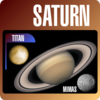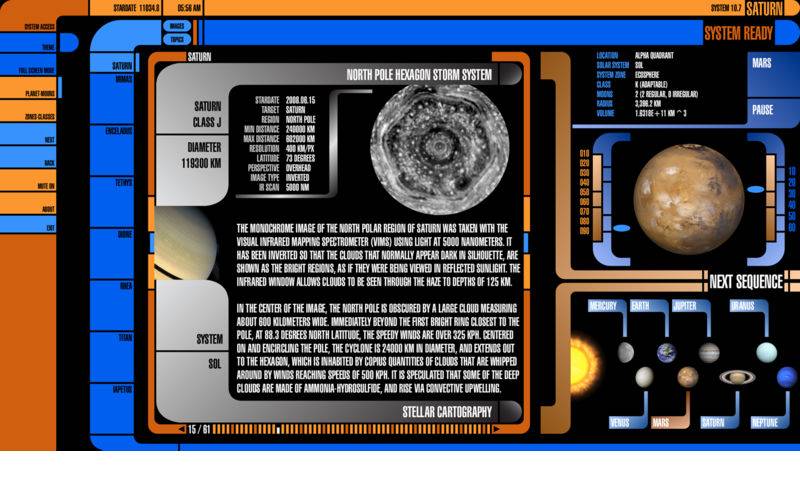点击按钮跳转至开发者官方下载地址...
***** SPECIAL INTRO PRICE OF $3.00 (70% OFF) *****
***** Saturn Plus for iPad is now available. *****
Saturn is an astronomy app that has over 500 images and graphics of the planet Saturn, its extensive ring system, and 7 major moons: Mimas, Enceladus, Tethys, Dione, Rhea, Titan, and Iapetus. There is extensive and detailed coverage of each of these worlds including over 100 topics. Cutting edge astronomy and beautiful images returned by the Cassini probe are augmented by a futuristic GUI.
After traveling hundreds of millions of kilometers, the Cassini spacecraft arrived in the Saturnian System in 2004. Subsequently over the last 8 years, tens of thousands of images of the Saturnian System, along with the data recorded by the instruments aboard Cassini, have been transmitted back to Earth. This app is the culmination of over a man-year of work and serves to chronicle and highlight the major discoveries of Cassini pictorially and through analysis of the returned data.
Hitching a ride within Cassini, the Huygens Probe was launched towards Titan, the largest moon in the Saturn system, and made an immediate descent through the thick Titan atmosphere and landed near the equator, recording the journey with a vast array of onboard sensors. This data was beamed back to Cassini, which eventually sent it back to NASA.
You can learn about the Saturnian magnetosphere and how it interacts with Saturn's moons, the amazing hexagonal storm system that encircles the north pole of Saturn, and the huge south polar cyclonic vortex. View the progression of a huge storm system that erupted in the northern latitudes of Saturn in late 2010 that still rages and completely encircles the planet in a 10000 kilometer band.
Saturnian weather is intense, with howling storms and extreme winds that churn the atmosphere and vary with the seasons.
Explore the icy plumes of Enceladus emanating from the Tiger Stripe sulci, the wracked and cratered landscapes of the cold ice moons, and the most beautiful, complex and expansive ring system in the solar system. Mimas and Iapetus each have a surface with a crater resembling the appearance of the Death Star. Check out "The Wall" on Iapetus; a mysterious complex ridge system that's hundreds of kilometers long and straddles the equator at towering elevations up to 11 kilometers tall.
Plus a lot more.
Start learning and exploring now with the coolest interactive astronomy app ever, and transport your imagination to the 24th century.
Topics:
SATURN:
• Physical
• Interior
• Atmosphere
• North Polar Hexagonal Storm System
• South Polar Storm System
• Magnetosphere
• Orbit
• Rings
• Atmospheric Methane Analysis
• North Polar Aurora
• Seasonal Atmospheric Color Changes
• Infrared and Ultraviolet imaging
• Ion Radiation Belts
• Magnetic Field Draping Around Enceladus
• Shepherd Moons and Ring Interactions
• Hyperion Moon
• Huge Northern Storm Band Ongoing Since 2010
• The Phoebe Ring
MIMAS:
• Herschel Crater
• Thermal Profile
• Orbital Resonances
• Morphology
• Topography
• Pandora
• Prometheus
• Orbit
• Physical
• Surface Materials
• Crater Materials
ENCELADUS:
• Interaction with Saturn's Magnetosphere
• South Polar Jets
• Atmosphere
• Surface
• Topography
• Sulci
• Plasma Torus
• Enceladus Ring
• South Polar Polygon
• Labtayt Sulci
• Tiger Stripes
• Baghdad Sulcus
• Damascus Sulcus
• Cairo Sulcus
TETHYS:
• Physical
• Orbit
• Geology
• Surface Materials
• Odysseus Crater
• Ithaca Chasma
• Scheria Montes
• Melanthius Crater
• Ogygia Chasma
• Penelope Crater
• Trojans
• Global Color Asymmetry
• Topography
DIONE:
• Leading Side vs Trailing Side
• Surface
• Surface Materials
• Cassandra Crater
• Chasmata/ice Cliffs
• Trojans
• Padua Chasmata
• Topography
• Geology
• Orbit
• Carthage Linea
• Amastrus Crater
• Eurotas Chasmata
• Erulus Crater
• Water Ice Absorption 3D Map







